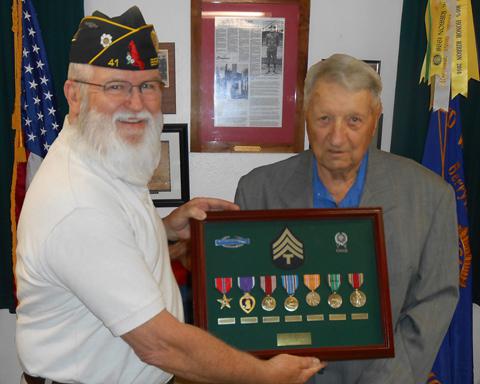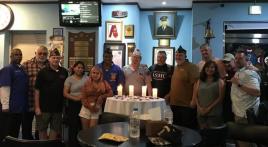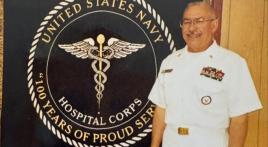During World War II, Charles E. “Charlie” Boyd served on two battle fronts, two continents\, and some Pacific islands. Because his unit was constantly on the move, he never received the medals and service ribbons he was entitled to for his service.
The officers of Lloyd Williams Post 41 in Berryville, Va., recently learned of this and decided to correct this oversight. Using a copy of his military records, the post ordered his medals and service ribbons. His decorations include a Bronze Star, Purple Heart, Combat Infantryman Badge, Good Conduct Medal, three Campaign Medals and a World War II Victory Medal.
At the May 7 Legion meeting, Commander Mike Linster presented Charlie with the medals and service ribbons he earned during the war. It only took about 70 years for him to finally receive his medals. Five generations of his family attended the presentation.
Born and raised in Frederick County, Virginia, Charlie was married, had a baby daughter and was working as a mechanic for the Hecht Company in Washington, D.C., when he learned that he was in the first group of married men in the county to be drafted. It was early 1943, and the war was raging in Europe and the Pacific.
Hecht officials didn’t want to lose a skilled mechanic, so they arranged for him to join the Coast Guard, where he could serve his country close to home and still help the company. But he failed the Coast Guard physical exam because of back problems.
He returned to Winchester to take his physical for the draft. The Army decided that he could be drafted but only give “limited service.” After basic training, he received a rifle and a boat trip to North Africa, where he joined the Allied invasion at Casablanca as part of Company A, 6th Armored Infantry Regiment, 1st Armored Division.
When the German army was driven out of North Africa, Charlie’s unit went to the coast, where the soldiers heard rumors that they would go home. Instead, they joined the invasion of Italy. Landing south of Naples under an erupting Mount Vesuvius, they fought their way north.
He was at Monte Casino, where the Allies suffered huge losses, before his unit was pulled out and sent north by boat. They landed at Nettuno and became part of the Anzio beachhead, where it took the Allied forces almost six months to break through the German defenses and move inland and up the Italian peninsula.
In February 1944, Charlie, who had been a ham radio operator in his youth, was temporarily serving in his unit's communication squad when the Germans attacked them. When he sought shelter in a ditch on the beachhead, some Germans shot holes in his pants and knocked a box of ammunition right out of his hand.
Later, as he sheltered in another ditch, two tanks took aim at the Allied positions and began lobbing in shells. One struck the ditch bank just to Charlie’s right, and the shock wave ruptured his ear. When the bleeding was spotted, he was told to go to the rear-echelon aid station. But since the tanks were firing in the direction of the aid station, he felt safer staying with his unit. Three days passed before he got to a hospital.
The hospital was in a tent between a gasoline depot and a supply depot. That, too, seemed like a good target for shelling, so when Charlie saw one of his unit’s trucks gassing up, he bummed a ride back to the front lines and rejoined his unit.
His commanding officer sent him to an Army school on the Italian coast to qualify as a radio operator. When he returned to his unit three weeks later, he learned that most of his squad had not survived the fight for the beach head. He was assigned as a radio repairmen with the Headquarters Company.
In May 1945, his unit was near the border of Italy and Switzerland when the Germans surrendered. Most of the men in his unit were being sent home, but Charlie’s radio repair group bordered a ship and sailed for 61 days to the Philippine Islands. The Army decided that he had been sent there by mistake, but he was still assigned to a signal depot company in Manila for the brief period before Japan's surrender.
In November 1945, he was discharged with the rank of Technician Fourth Class and returned home to Winchester - without his medals. Charlie’s “limited service” during the war included active fighting on two battle fronts, two continents and the Philippine Islands.
After the war, he operated a television sales and repair store in Berryville for over 20 years. He has been a member of Lloyd Williams Post 41 for 61 years and has served as vice commander and chaplain. Charlie recently celebrated his 97th birthday.





